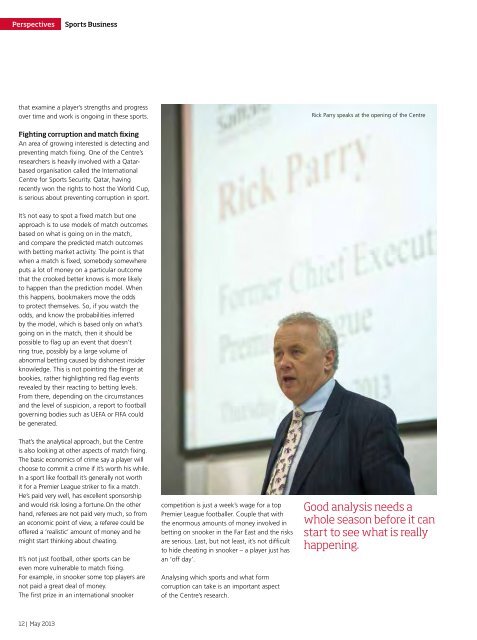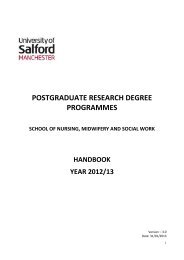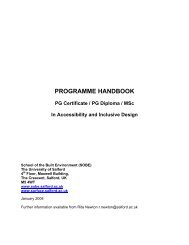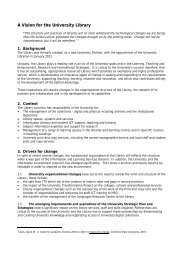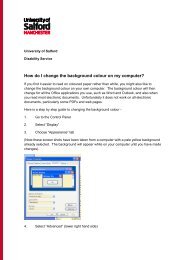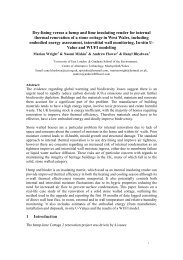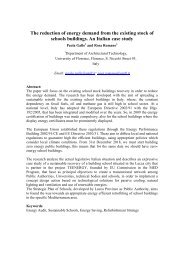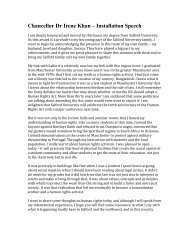PerspectivesSports Businessthat examine a player’s strengths and progressover time and work is ongoing in these sports.Rick Parry speaks at the opening <strong>of</strong> the CentreFighting corruption and match fixingAn area <strong>of</strong> growing interested is detecting andpreventing match fixing. One <strong>of</strong> the Centre’sresearchers is heavily involved with a Qatarbasedorganisation called the InternationalCentre for Sports Security. Qatar, havingrecently won the rights to host the World Cup,is serious about preventing corruption in sport.It’s not easy to spot a fixed match but oneapproach is to use models <strong>of</strong> match outcomesbased on what is going on in the match,and compare the predicted match outcomeswith betting market activity. The point is thatwhen a match is fixed, somebody somewhereputs a lot <strong>of</strong> money on a particular outcomethat the crooked better knows is more likelyto happen than the prediction model. Whenthis happens, bookmakers move the oddsto protect themselves. So, if you watch theodds, and know the probabilities inferredby the model, which is based only on what’sgoing on in the match, then it should bepossible to flag up an event that doesn’tring true, possibly by a large volume <strong>of</strong>abnormal betting caused by dishonest insiderknowledge. This is not pointing the finger atbookies, rather highlighting red flag eventsrevealed by their reacting to betting levels.From there, depending on the circumstancesand the level <strong>of</strong> suspicion, a report to footballgoverning bodies such as UEFA or FIFA couldbe generated.That’s the analytical approach, but the Centreis also looking at other aspects <strong>of</strong> match fixing.The basic economics <strong>of</strong> crime say a player willchoose to commit a crime if it’s worth his while.In a sport like football it’s generally not worthit for a Premier League striker to fix a match.He’s paid very well, has excellent sponsorshipand would risk losing a fortune.On the otherhand, referees are not paid very much, so froman economic point <strong>of</strong> view, a referee could be<strong>of</strong>fered a ‘realistic’ amount <strong>of</strong> money and hemight start thinking about cheating.It’s not just football, other sports can beeven more vulnerable to match fixing.For example, in snooker some top players arenot paid a great deal <strong>of</strong> money.The first prize in an international snookercompetition is just a week’s wage for a topPremier League footballer. Couple that withthe enormous amounts <strong>of</strong> money involved inbetting on snooker in the Far East and the risksare serious. Last, but not least, it’s not difficultto hide cheating in snooker – a player just hasan ‘<strong>of</strong>f day’.Analysing which sports and what formcorruption can take is an important aspect<strong>of</strong> the Centre’s research.Good analysis needs awhole season before it canstart to see what is reallyhappening.12 | May 2013
The National LotteryAnalytics can also be used to demonstrate thatmatch fixing or other forms <strong>of</strong> malpracticehave not been taking place. A good example isthe Centre’s work for the UK National Lotteryvia the Gambling Commission. Given the size<strong>of</strong> the lottery, it is not surprising that a smallnumber <strong>of</strong> people develop varying levels <strong>of</strong>conspiracy theories about the appearance <strong>of</strong>certain numbers or combinations <strong>of</strong> numbers.Someone might call up and say ‘36 hasappeared three times in the last four weeks,this is clearly impossible and the lottery mustbe a fix’. So, the Lottery uses statisticians atthe Centre to run a series <strong>of</strong> tests to show itis random and nobody is cheating or beingcheated. People tend to think it’s extremelyunlikely that two consecutive balls will appearin the lottery and complain if this happens ona regular basis.It should be possible t<strong>of</strong>lag up an event thatdoesn’t ring true, possiblycaused by a large volume<strong>of</strong> abnormal betting.In fact, quite simple probability theoryreveals that the odds <strong>of</strong> consecutive numbersappearing is actually nearly 0.5 and so willhappen nearly every other week in thelong run.MBA in Sports BusinessThe intention <strong>of</strong> the new Centre is to bemore than a hub for research, however.From January 2014 it will <strong>of</strong>fer an MBAin sports business, designed to producetomorrow’s leaders <strong>of</strong> the sporting world.While a few other British universities <strong>of</strong>fer anMBA in sports management, no other Centreis able to <strong>of</strong>fer the range and depth <strong>of</strong>expertise; for example, <strong>Salford</strong> was rankedsecond worldwide for sports economicsresearch in a 2009 review.The Centre is fortunate in that the reputation<strong>of</strong> its members has attracted prominentindustry figures right from the start. As well ashis launch lecture, Rick Parry has agreed to givea series <strong>of</strong> talks to MBA students. So, as wellas traditional lecturers drawn from academia,leading representatives from the sportingworld will teach modules and give lectures toMBA students. Perhaps the last word on thenew Centre for Sports Business should go toits director, Dr Ian McHale."You only have to look at the interest andexcitement last year’s Olympics brought to theUK to see how much sport matters to us. And<strong>of</strong> course it is not just here that sport meansso much – sport is a global business and tome, there is no doubt about it, it is the mostexciting business there is."Here at <strong>Salford</strong> we are extremely fortunate inhaving a group <strong>of</strong> academics who, during thelast ten years and more, have earned a globalreputation for high-quality research in each <strong>of</strong>our subject disciplines when applied to sport.This group <strong>of</strong> people now form the Centre forSports Business."So who are we? We have expertisein statistics, economics, business andmanagement and law. We already constitutewhat is arguably the leading collection <strong>of</strong>researchers into quantitative analysis in sportsfrom around the world."But it is not just research we do – we areheavily involved in consultancy projects withinthe sports and betting industry. From developingthe EA SPORTS Player Performance Index toadvising governments and sport’s governingbodies on strategies to detect and preventCentre for Sports BusinessThe Centre for Sports Business promotesresearch and consultancy in sportsstatistics and analytics, sport finance,sports law and the economics <strong>of</strong> sport.It boasts a continued record <strong>of</strong> worldrenownedresearch with its memberspublishing their work in top-ratedacademic journals.To discuss a PhD, business or studyproposal, please contact the Director,Dr Ian McHale on +44 (0)161 295 4765or i.mchale@salford.ac.uk.Co-Director Pr<strong>of</strong>essor Chris Brady can becontacted on +44 (0)7956 575278.To receive research findings, reports andpapers, please send your details tosportsbusiness-sbs@salford.ac.ukwww.salford.ac.uk/sports-businessmatch fixing, the Centre for Sports Business isalready at the heart <strong>of</strong> the sports business."The primary concern <strong>of</strong> a university is itsstudents and teaching. We are currentlydeveloping an MBA in Sports Business –designed to produce tomorrow’s chiefexecutives and leaders in the sports industry."May 2013 | 13


